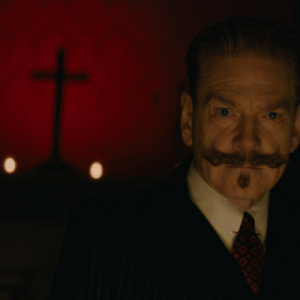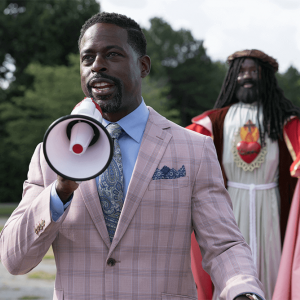
Joe George is a pop-culture writer whose work has appeared at Think Christian, Polygon, The Progressive, and elsewhere. He tweets from @jageorgeiii and collects his work at joewriteswords.com.
Posts By This Author
‘Daredevil: Born Again’ Is the Story of a Hero’s Backslide
Born Again opens by bringing back the central members of the Netflix series cast, including Charlie Cox as blind lawyer Matt Murdock, Elden Henson as his best friend and partner Foggy Nelson, and Deborah Ann Woll as his love interest and other partner Karen Page. Within minutes, they’re attacked by the super-assassin Bullseye (Wilson Bethel) and Matt changes into Daredevil to fight back. But he’s not quick enough to stop Bullseye from killing several innocents, including Foggy. After Matt tries to kill Bullseye in retaliation, he decides to put his vigilante days behind him and seek justice through the law instead of through fighting on rooftops.
To put it another way, Matt decides that vigilantism has failed and it’s time to put his faith in the law. Yet, each episode of Born Again has put that faith to the test — with decidedly mixed results.
‘The Monkey’ Critiques Faith Built on Safety and Certainty
At the first of what will be many funerals that appear in The Monkey, a young priest struggles to find the right words. After offering some half-hearted bromides about how everything happens for a reason, the priest can no longer pretend that there’s some divine plan behind the death that brought them together — an accident involving a hibachi chef’s knife getting too close to a diner.
“It is what it is,” the priest (Nicco Del Rio) finally declares, with the most conviction he can muster. “The words of the Lord.”
Powers, Principalities, and ‘The Penguin’
Over the course of the HBO series The Penguin, Sofia Gigante transforms from abused daughter of Gotham City mobster Carmine Falcone to a proper supervillain, the head of her own crime family. Sofia has chosen a new surname for herself. By going from Falcone to Gigante, she signals that she’s different from her father. Sure, Sofia’s still committing crimes (like he did) and killing people (like he did), but she's convinced there’s something righteous in her ascension: Her rise to power represents a rejection of the misogyny that’s always plagued her.
In ‘Perfect Days,’ Toilet-Cleaning Is Sacred
Hirayama’s mundane work of toilet washing becomes a sanctified act, for one simple reason: He does it for other people.
A Murder Mystery With Seances and Surprisingly Accurate Christian Ethics
“No god, no gods, no spirits,” declares Detective Hercule Poirot in A Haunting in Venice. “It’s only us.” Throughout the film, in theaters now, Poirot (Kenneth Branagh) points his ostentatious mustache at all manner of explanations to discredit the spiritualist Mrs. Reynolds (Michelle Yeoh) and her apparent powers of divination. But Poirot doesn’t just want to expose the alleged artifice of Mrs. Reynolds’ powers; he wants to reject any and all higher power. In a world so full of injustice, Poirot reasons, how could a just and powerful God exist?
In ‘Asteroid City,’ Spiritual Longing Takes Center Stage
In Asteroid City, Anderson buries ineffable grief under layers and layers of artifice.
In ‘Ted Lasso’ as in the Gospel: Forgiveness Is Frustrating
Ted Lasso season three has been unbelievable, and not just because season two ended with the destruction of the series’ defining image: a yellow paper sign with the word “BELIEVE” scribbled across it.
Grace is a Scarce Resource in ‘The Last of Us’
The Last of Us has some of the characters you’d expect in an end-of-the-world series, including Bill, a survivalist portrayed with comical stoicism by Nick Offerman. Only one word can describe the look on Bill’s face when he emerges from his stately New England home, lowers his pistol, and pulls off his gas mask: relief. Not relief that his neighbors were still there, saved from the disaster that government officials had been warning them about, but quite the opposite: Bill’s relief comes from the fact that his neighbors have gone, evacuated to a quarantine zone while he hid in his heavily fortified safe room. With the entire town to himself, Bill indulges in his new life and gets what most doomsday preppers only dream of: an actual doomsday.
‘Tár': If an Artist Moves Mountains, But Does Not Love, She Is Nothing
Tár may be a 158-minute movie, but it starts rolling its credits at the beginning of the film. Not the usual type of opening credits, listing the names of movie stars and the director. Rather, Tár begins with what movie industry folks call “below-the-line” credits, showing the names of orchestra musicians and the various studio personnel. Most movies would save these credits for the end of the film, but Tár begins by listing every musician and laborer’s name, glowing white text on a black background.
In ‘Honk for Jesus,’ a Prosperity Pastor Hides His Demons
Honk for Jesus follows Lee-Curtis and his wife First Lady Trinitie Childs (Regina Hall) as they prepare a grand reopening for their Atlanta-area megachurch.
Christians Need a Renewed Imagination, Not ‘Copaganda’
Copaganda refers to any piece of media that portrays police as a necessary social institution. While this can include viral videos of police chatting with neighborhood kids or doing lip-sync battles, the most pervasive examples of copaganda are found in pop culture.










